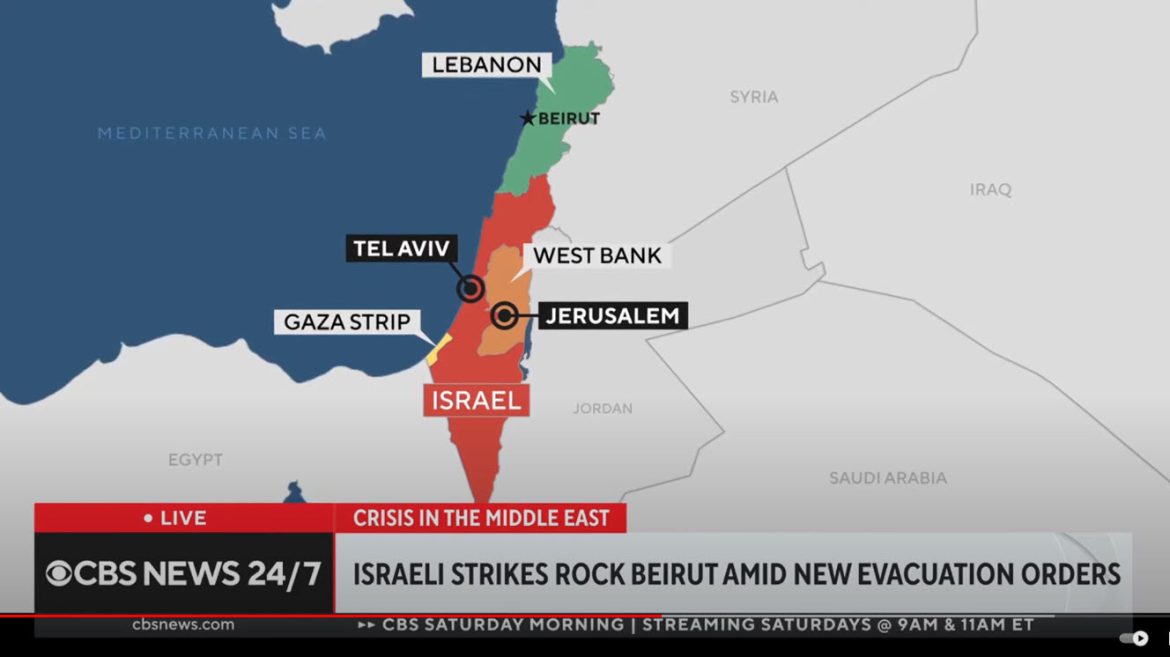The Israeli military has launched a series of heavy airstrikes on Beirut overnight, targeting what it believes is the next leader of Hezbollah, the militant group that has long been a source of tension between Israel and Lebanon. The strikes come in the wake of last week’s death of Hezbollah’s long-time chief, Hassan Nasrallah, who was killed in an airstrike on a residential neighborhood in the Beirut area. According to reports, Nasrallah has been buried in a secret funeral as Hezbollah sought to avoid making his death a target for further Israeli attacks.
The situation in Lebanon has escalated dramatically since mid-September, with Israeli airstrikes killing over 1,300 people across the country and displacing nearly a million, according to Lebanese officials. The Israeli military has ramped up operations targeting Hezbollah fighters and infrastructure, particularly in southern Lebanon, where the group’s forces are heavily concentrated.
Lebanese Forces Return Fire for the First Time
For the first time since the current conflict began, Lebanon’s army has responded to Israeli attacks by firing back at Israeli forces. The Lebanese army confirmed the development on Thursday, stating that one of its soldiers was killed when Israeli Defense Forces (IDF) targeted a Lebanese military post. The exchange of fire underscores the growing tensions not only between Israel and Hezbollah but also between the two countries’ regular military forces.
The escalation comes amid increasing instability in the Middle East, with Iran also launching missile strikes on Israel earlier in the week. The Israeli military has vowed to retaliate, though President Joe Biden has cautioned against further escalation, especially targeting Iran’s nuclear sites. Biden stated during a White House briefing on Friday that while Israel has the right to defend itself, it must be more careful about avoiding civilian casualties, particularly in heavily populated areas like Beirut.
Iran’s Supreme Leader Speaks After Israeli Strikes
Following the latest round of Israeli airstrikes, Iran’s Supreme Leader Ayatollah Ali Khamenei delivered a rare sermon in Tehran, vowing that Iran and its allies, including Hezbollah, would not back down in the face of Israeli aggression. Khamenei’s speech came amid reports that Israel’s military had intensified its operations in southern Lebanon, forcing mass evacuations in the region. The Israeli government has expanded its evacuation zone north of the Litani River, warning residents to flee as Israeli ground forces continue their assault on Hezbollah strongholds.
Khamenei’s speech marks the first time in years that the Iranian leader has presided over Friday prayers, highlighting the gravity of the situation and Iran’s direct involvement in the growing regional conflict.
Israel Expands Ground Offensive and Evacuation Zone in Southern Lebanon
On the ground, Israeli forces have widened their evacuation zone in southern Lebanon, issuing warnings to communities north of the Litani River. Israeli airstrikes have already hit approximately 200 Hezbollah targets in the south, including weapons depots, military installations, and suspected leadership hideouts. The expanded perimeter exceeds the buffer zone established by the United Nations during the 2006 war, signaling that the conflict may further escalate and spread deeper into Lebanese territory.
Israeli Defense Forces (IDF) officials have indicated that this phase of the operation is focused on dismantling Hezbollah’s military capabilities, especially in light of Nasrallah’s death and the emergence of a new, yet unnamed leader within the group. Israel sees this leadership transition as an opportunity to strike a decisive blow against Hezbollah, which has been designated a terrorist organization by Israel and many of its allies.
President Biden Urges Restraint as Conflict Grows
During a press briefing at the White House, President Biden acknowledged Israel’s right to defend itself but urged the country to exercise caution regarding civilian casualties. “Israel has every right to retaliate for the missile attacks from Iran, but it must do so while minimizing harm to civilians,” Biden said, emphasizing that the U.S. remains in constant communication with Israeli officials to try to de-escalate the conflict.
Biden also dismissed recent rumors suggesting that Israeli Prime Minister Benjamin Netanyahu is delaying a ceasefire with Hamas in an attempt to influence the upcoming U.S. presidential election. “There’s no truth to that,” Biden said. “Our goal, and Israel’s goal, is to end the fighting and restore stability.”
Growing Tensions and Regional Instability
The conflict has reached a dangerous tipping point, with multiple actors—including Iran, Hezbollah, and Lebanon’s armed forces—now actively engaged. Iran’s missile barrage earlier this week, reportedly involving over 180 missiles, has only heightened fears of a broader regional war. Israeli officials claim Iran has even used hypersonic weapons in these strikes, escalating the stakes in the ongoing conflict.
Meanwhile, the growing tension is complicating air travel in the region, with commercial airlines being forced to reroute flights around Iranian and Israeli airspace. Some airlines have deemed Taliban-controlled Afghanistan a safer route than the volatile region stretching across Iran, Lebanon, and Israel, further underscoring the severity of the crisis.
As the situation develops, international leaders are urging both sides to seek diplomatic solutions, but with Hezbollah, Iran, and Israel all deeply entrenched, the path to peace remains fraught with challenges.



